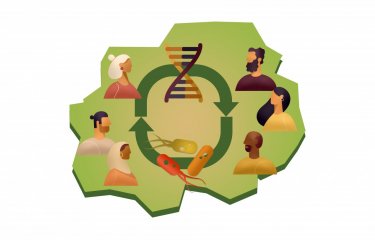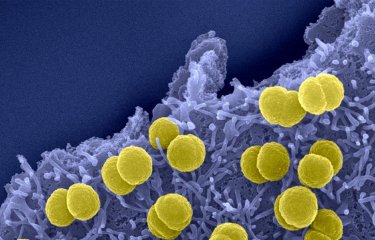A recent study, co-edited by Canadian researchers (CHU Sainte-Justine, the Université de Montréal) and French researchers (the Institut Pasteur and the university Paris-Diderot), presents a model that can predict the effect of a genetic variant on a person’s cognitive traits and estimate the impact of genetic mutations on IQ. This discovery opens the way to a better interpretation of genetic analyzes and better care for children at risk of developing neurodevelopmental disorders, from a very young age. These results have just been published in the science journal JAMA Psychiatry.
About 3% to 7% of the general population have neurodevelopmental and psychiatric disorders, including intellectual disabilities, autism spectrum disorder and schizophrenia. Genetic tests commonly performed in these patients identify in 10-15% of cases, mutations contributing to neurodevelopmental disorders. However, the effect of 90% of these mutations is not known because they are very rare. How the effects of these rare and unknown variants on a person’s cognitive development be assessed?
A recent study published in the science journal JAMA Psychiatry, co-edited by researchers at CHU Sainte-Justine, the Université de Montréal, the Institut Pasteur and the Université Paris-Diderot, presents a model that can predict the effect of a genetic variant on a person’s cognitive traits.
“In practical terms, our model estimates the number of lost intellectual quotient (IQ) points induced by a deletion, wherever its location, in the patient’s genome. It relies on the fact that each gene defines a piece of biological information. When a gene is modified, its biological function risks being affected. If that function is related to cognition, the patient is exposed to a risk of having a neurodevelopmental disorder. Furthermore, these effects are cumulative, leading to an increased risk,” stated Guillaume Huguet, PhD, co-lead author of the study.
To reach these conclusions, the research team worked on two cohorts of the general population, with a total of 2,711 people. Initially, they identified variations (deletions and duplications) in the number of copies of genes in the subjects’ DNA. The research team explored the intrinsic characteristics of each deletion, such as the size, the number of genes lost or the haploinsufficiency score, that is, the organism’s intolerance for losing a copy of the gene and the resulting alteration of its biological function. The team then classified the results based on their “predictive power,” defining the genetic information that best characterizes the impact of deletion on the IQ.
To ascertain the relevance of the model, the researchers tested it against recurring deletions with a well-known impact on IQ. The rate of agreement between the observations in the literature and the model was 75%.
“We should point out that our model cannot predict the IQ of an individual, but rather the loss of IQ points associated with the presence of a deletion in the genome. If the mutation has a significant effect and is consistent with the cognitive impairment of the patient, we can consider that this mutation represents a major diagnostic factor in the patient,” explained Sébastien Jacquemont, MD, a clinician-scientist at CHU Sainte-Justine and a professor in the Department of Pediatrics at the Université de Montréal.
This discovery proposes a new method for the study of mutations whose rarity does not make it possible to use conventional approaches. It paves the way to a better interpretation of genetic analyzes and to better care for children at risk of developing neurodevelopmental disorders, from a very young age.

Professor Thomas Bourgeron, head of the Human genetics and cognitive functions Unit at the Institut Pasteur
Our model will help clinicians estimate the cognitive impact of rare and undocumented genetic variants. This information will allow appropriate care to be put in place to try to compensate for the impact of these deleterious variants.
The team is now pursuing its research to explore other behavioral phenotypes using this same genetic analysis approach.
About the study
The co-lead authors are Guillaume Huguet, PhD, and Catherine Schramm, PhD, both postdoctoral fellows under the direction of Sébastien Jacquemont at the CHU Sainte-Justine. The co-principal authors are Sébastien Jacquemont, MD, a doctor, geneticist and researcher at the CHU Sainte-Justine, associate professor in the Department of Pediatrics at the Université de Montréal and the scientific director of CARTaGENE, and Thomas Bourgeron, PhD, researcher at the Institut Pasteur, France, and assistant professor at the Université Paris-Diderot.
This research was enabled by support provided by Calcul Quebec and Compute. Dr Bourgeron is supported by the Institut Pasteur, the University Paris Diderot, and the Bettencourt-Schueller Foundation. Dr Jacquemont is a recipient of a Bursary Professor fellowship of the Swiss National Science Foundation, a Canada Research Chair in neurodevelopmental disorders, and a chair from the Jeanne et Jean Louis Levesque Foundation. Dr Huguet is supported by the Sainte-Justine Foundation, the Merit scholarship program for foreign students, and the Network of Applied Genetic Medicine fellowships. Dr Schramm is supported by the Institute for Data Valorization fellowship. Dr Loth is supported by European Autism Interventions, which receives support from the Innovative Medicines Initiative Joint Undertaking under grant agreement 115300, the resources of which are composed of financial contributions from grant FP7/2007-2013 from the European Union's Seventh Framework Programme, the European Federation of Pharmaceutical Industries and Associations companies’ in-kind contributions, and Autism Speaks. This work is supported by a grant from the Brain Canada Multi Investigator initiative (Dr Jacquemont). The Canadian Institutes of Health Research and the Heart and Stroke Foundation of Canada fund the Saguenay Youth Study. Funding for the project was provided by the Wellcome Trust.
Source
Measuring and Estimating the Effect Sizes of Copy Number Variants on General Intelligence in Community-Based Samples, JAMA, March 21, 2018
Guillaume Huguet (1,2) ; Catherine Schramm (1,2,3) ; Elise Douard (1,2) ; Lai Jiang (3) ; Aurélie Labbe (4) ; Frédérique Tihy (1,2) ; Géraldine Mathonnet (1,2) ; Sonia Nizard (1,2) ; Emmanuelle Lemyre (1,2) ; Alexandre Mathieu (5,6) ; Jean-Baptiste Poline (7) ; Eva Loth (8) ; Roberto Toro (5,6) ; Gunter Schumann (8) ; Patricia Conrod (1,2,8) ; Zdenka Pausova (9) ; Celia Greenwood (3,10) ; Tomas Paus (11,12,13) ; Thomas Bourgeron (5,6,14) ; Sébastien Jacquemont (1,2) ; for the IMAGEN Consortium
1 Department of Pediatrics, Université de Montréal, Montreal, Quebec, Canada
2 Center Hospitalier Universitaire Sainte-Justine Research Center, Montreal, Quebec, Canada
3 Lady Davis Institute for Medical Research, Jewish General Hospital, Montreal, Quebec, Canada
4 Département de Sciences de la Décision, HEC Montreal, Montreal, Quebec, Canada
5 Department of Neurosciences, Human Genetics and Cognitive Functions, Institut Pasteur, Paris, France
6 Centre National de la Recherche Scientifique Genes, Synapses and Cognition Laboratory, Institut Pasteur, Paris, France
7 Department of Psychology, Berkeley University, Berkeley, California
8 Institute of Psychiatry, Psychology, and Neuroscience, King’s College London, London, England
9 The Hospital for Sick Children, University of Toronto, Toronto, Ontario, Canada
10 Departments of Human Genetics and Oncology, McGill University, Montreal, Quebec, Canada
11 Rotman Research Institute, Baycrest, Toronto, Ontario, Canada
12 Departments of Psychology and Psychiatry, University of Toronto, Toronto, Ontario, Canada
13 Child Mind Institute, New York, New York
14 Human Genetics and Cognitive Functions, University Paris Diderot, Sorbonne Paris Cité, Paris, France





